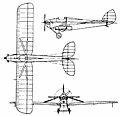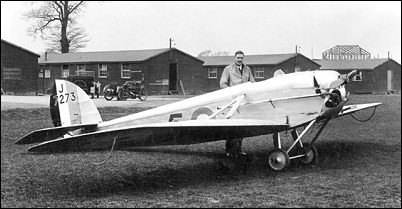|
| De Havilland entered the field of ultralight
aircraft with the de Havilland
D.H.53 Humming Bird which was
built for the Daily Mail light aeroplane
trials held at Lympne, Kent, in October
1923.
Two examples of the little monoplane
were built, powered by 750cc Douglas motorcycle engines, and in
spite of considerable problems with this
powerplant both aircraft did well.
In an effort to make the type more reliable,
a Blackburn Tomtit engine was installed
and other detail changes made
before the Humming Bird was flown to
the Brussels Aero Show in 1923. It later
took part in several air races together
with the second aircraft, owned by a
group of RAF officers who re-engined it
with a 26kW A.B.C. Scorpion
engine which proved unreliable.
Because of its economical performance,
the first Humming Bird had
secured for de Havilland an Air Ministry
order for eight aircraft for communications
and flying practice. Five others
were built for civil customers, three
going to Australia, one to Czechoslovakia
and one to Russia.
The last two RAF Humming Birds
were used in experiments which involved
launching them from the airship
R-33 and recovering them in the air. Following
the disposal of all eight aircraft by
the RAF in 1927, six were civil registered
and flown for several years. One survives
with the Shuttleworth Trust at Old
Warden, having been rebuilt with a number of new components post-war. It was
flown on occasions, but following extensive
damage is no longer airworthy
and maintained as a static exhibit.
| MODEL | D.H.53 |
| ENGINE | 1 x Blackburn Tomtit two-cylinder vee piston engine, 19kW |
| WEIGHTS |
| Take-off weight | 256 kg | 564 lb |
| Empty weight | 148 kg | 326 lb |
| DIMENSIONS |
| Wingspan | 9.17 m | 30 ft 1 in |
| Length | 5.99 m | 20 ft 8 in |
| Height | 2.21 m | 7 ft 3 in |
| Wing area | 11.61 m2 | 124.97 sq ft |
| PERFORMANCE |
| Max. speed | 117 km/h | 73 mph |
| Cruise speed | 97 km/h | 60 mph |
| Ceiling | 4570 m | 15000 ft |
| Range | 241 km | 150 miles |
 | A three-view drawing (800 x 771) |
| Barry Baseley, 17.01.2017 17:41 If the height of this plane is 7'3" then that must be a giant standing next to the plane in the photograph. reply | | Michael Ingram, e-mail, 27.02.2014 07:29 Sorry about earlier comment email typo. This is the correct one. reply | | Michael Ingram, e-mail, 27.02.2014 07:27 I am building a flying replica using a modern engine only. Any tips? reply | | sven, 03.07.2012 12:01 A sad day for Old Warden.Our thoughts are with the pilots family reply | |
| | C A Davis, e-mail, 02.07.2012 03:01 1st July 2012
The Shuttleworth Collection confirmed in a statement on its website that a DH 53 had experienced difficulties and crashed durring an airshow. The Pilot didnt suvive the crash. reply | | Giacomo Mazzari, e-mail, 16.01.2012 23:36 I am an Italian modeler and am building this aircraft at 1 /3 scale, therefore I am interested on purcase a detailed 3-view, can you help me?
Regards, Giacomo Mazzari reply | | Robin Miller, e-mail, 12.11.2010 23:21 I worked in the Flight Test Department at Hatfield in the 1960s. The aircraft was kept in our hanger with the Comets, Sea Vixens etc. I remember it being flown by, I believe, Chris Capper one day and the 2BA bolt holding the bush that held the port main wheel on - fell off. So the main wheel did likewise, leaving the a /c airborne with only one wheel. This resulted in Air Traffic declaring a full scale emergency. The a /c had no radio so the pilot was unaware of his predicament. Every fire engine and ambulance on the site stood to to await the expected disaster. What no one thought of was that the DH 53 had bamboo hoops under the wing tips to prevent the wing tip digging in if the pilot failed to keep the wings level on landing. These were perfectly capable of keeping the wings more or less level even without one main wheel. Chris landed the aircraft and was immediately surrounded by Hatfield's huge fire engines daring the a /c to catch fire. Chris just walked away smiling. reply | | Robert Davidson, e-mail, 03.05.2010 16:25 Have started a 1 /4 scale flying model of CF-OVE. I'm the son of Ron Davidson mentioned above in Wendell's paragraph. As far as I know this Hummingbird is still in the possession of the Western Development in Moose Jaw. reply | | Merv. Thompson, e-mail, 29.12.2009 00:47 Am trying to get as much detail as possible as I want to build an accurate (flying)replica. I will use modern avionics and engine.At this stage both Shuttleworth and Aeroplane Monthly have been of tremendous help but I still need plans or constructional info. Can anyone help? reply | | Wendell Hughes, e-mail, 31.01.2009 19:07 CF-OVE was built by Stan Greene in Calgary in 1967.
That is Gordon Friar in the cockpit.
It was powered by a Continental A-40
Stan sold it to Ron Davidson, who was an instructor at CFB
Moose Jaw, Saskatchewan.
Ron's brother Neil flew it to Ron's farm south of Moosejaw
in September 1968.
I drove along underneath on the Trans-Canada highway, with
a bedsheet tied to my door handle.
This was so I could be spotted easily, for the cow pasture
refueling.
Great Fun it was! reply | | Roger Allton, e-mail, 12.01.2009 20:36 12 /01 /2009: Shuttleworth's DH 53 is alive and well.
There is another (Cherub powered ex R 33 trials)at the London Colney Mosquito museum.
Sincerely,
Roger reply | | Don Goodsell, e-mail, 16.11.2006 04:30 As an apprentice at Hatfield in the late 1950s I worked on the re-construction of the Humming Bird for the Shuttleworth Trust. As many of the original drawings had gone missing one of my tasks was to design the tail-skid - laminated ash with an S96 steel end-pad if I remember rightly. The ABC Scorpion engine was a liability, apart from sounding like a pneumatic drill. I remember it failing in flight at Old Warden while over the small crowd of spectators. The pilot just managed to clear the crowd, but the undercarriage collapsed on the forced landing and the pilot was knocked unconscious. reply |
|
Do you have any comments?
|
| 
COMPANY
PROFILE
All the World's Rotorcraft
|








